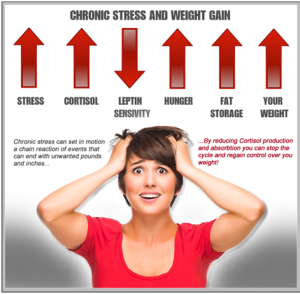The human reaction to stress is designed as a survival mechanism for the body. It is a complex cascade of hormonal interactions that exert a profound effect on many physiologic systems to help protect us from internal (illness) or external (sabre-toothed tiger) danger. Unfortunately, in today’s world, rather than a single fight-or-flight episode, such as running from a dangerous animal, our body is faced with a multitude of smaller but more chronic stressors such as:
- unstable blood sugar levels
- less than 8 hours of sleep
- bad traffic
- excessive workload
We also suffer from perceived stress, our mental interpretation of an event, such as a wedding, moving, changing jobs, etc, which causes identical stimulation to our nervous system without ever truly being “dangerous”. Despite man’s many advances, our neuro-chemical and hormonal reactions to stress, (the Hypothalamic-Pituitary-Adrenal or HPA-axis), have not changed greatly since our caveman days. Designed for acute stressors that resolve rapidly, our present-day, chronic, low-grade stress results in the continual release of CRH (Corticotrophin Releasing Hormone) from the hypothalamus, that area in the lowest region of the forebrain, primarily concerned with survival. This chronic secretion causes dysfunction in the HPA axis, desensitizing the hypothalamic and pituitary receptors to negative feedback from adrenaline, noradrenaline and particularly, cortisol.
Loss of negative feedback within the neuro-hormonal system creates a multitude of ailments and conditions. It can increase blood pressure, raise C-reactive protein (a marker for inflammation), directly increase LDL production, and promotes atherosclerosis (hardening or calcification of the arteries). Stress also has a direct impact on inflammatory bowel disease causing inflammation and disrupting healing in the bowel.
One of the most detrimental and profound effects of chronic stress is weight gain. In a society where 65% of individuals are overweight and 31% are clinically obese, chronic stimulation of the HPA-axis can therefore be viewed as one of the most prevalent risk factors to our health. Cortisol inhibits the release of leptin – a hormone that aids in reducing our appetite after a meal and “jump starts” our metabolism. The inhibition of leptin not only increases food cravings but reduces our metabolic rate, and impairs fat burning by over 60%. Stress also triples the release of insulin in response to grains, starches, sweets and fruits, forcing the body to treat one slice of bread as if it were three, one cookie as three cookies and so on. This promotes amplified fat storage, particularly in the abdominal region where white fat cells have three times the number of cortisol receptors on their surface. To make matters worse, CRH and cortisol block the production and binding of both serotonin and dopamine. This combination of imbalanced hormones destabilizes mood and stimulates further food cravings.
Here are a few of my favorite nutrients to help regulate our body’s response to stress:
- L-Theanine is a unique amino acid found naturally in green tea can help inhibit beta wave brain activity, the activity that is responsible for incessant racing thoughts, and promote alpha wave activity, the calming focused brain wave activity. It can also help regulate serotonin, GABA and dopamine production, all favoring the quiet campfire state of mind.
- Vitamin D has been included for additional support of immune function that may be compromised during stress. Vitamin D has many functional roles in the body, including modulation of cell growth, neuromuscular and immune function, bone health and inflammatory support.
- GABA has a stress inhibitory effect on the hypothalamus, decreasing glucocorticoid secretion, and on the posterior amygdala, moderating feelings of fear and emotion.
- Adaptogenic Herbs such as: eleutherococcus, ashwagandha, rhodiola, etc, help balance and modulate the HPA system as well.
Another key element to further controlling cortisol and the HPA disruption is dietary modification. Blood sugars are balanced by eating lean protein at each meal, (such as fish, egg whites, high quality whey protein powders without artificial sweeteners, chicken and turkey) along with nutrient dense vegetables and legumes. Temporarily eliminating or minimizing the carbohydrates that trigger excess insulin release is also vital until the HPA-axis is reset.
When negative feedback within the HPA-axis is disrupted, chronic hormonal secretion becomes “normal” for that individual. In this state, they either fail to recognize that they are stressed, or they experience an exaggerated emotional and physical response to every stressor, such as intolerance to noise or light, or a feeling of being overwhelmed when asked to perform a simple task. This often leaves them feeling helpless or defeated, one of the most unhealthy and powerless places to be. Although the external and internal stress load is certainly not decreasing in our society, we can regain control over our response to it, protecting ourselves from stress-induced illness.

